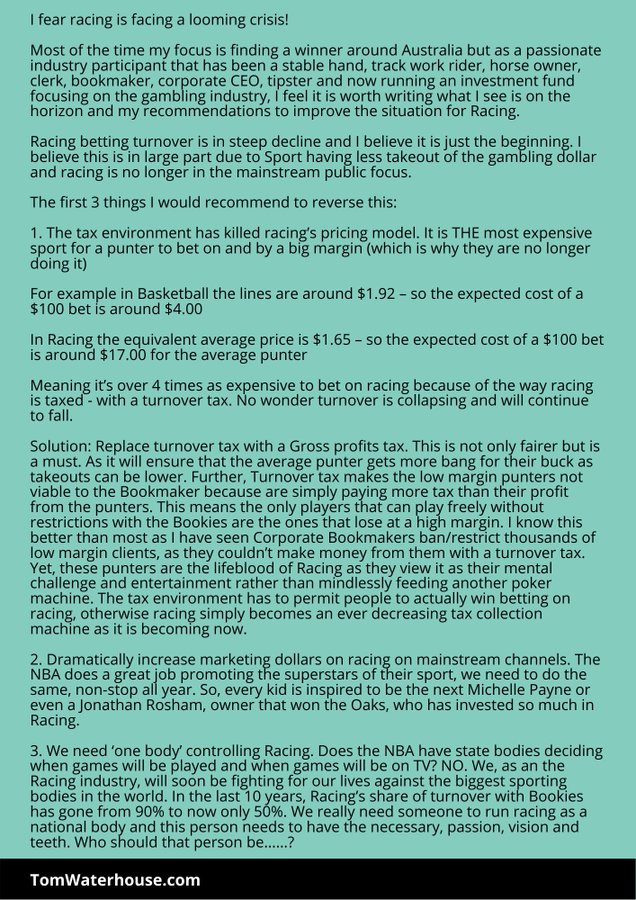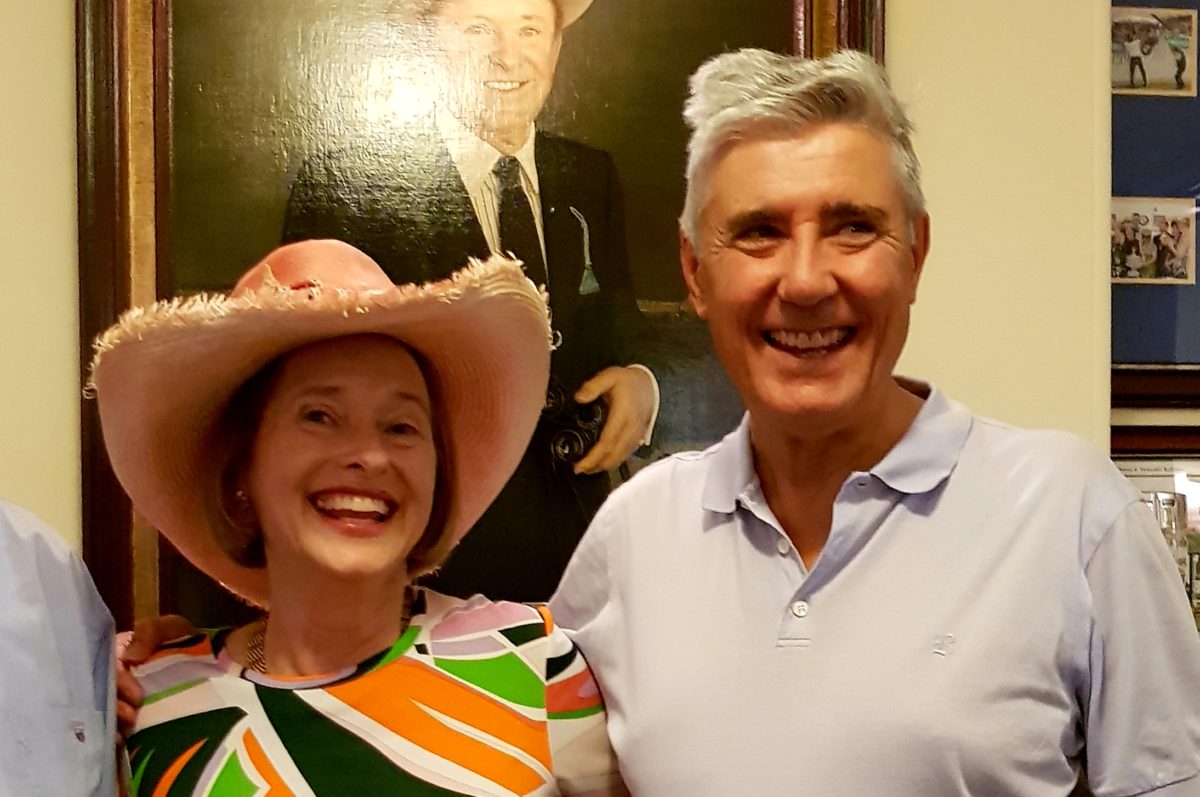Robbie and Gai Waterhouse at Tulloch Lodge
by Brian de Lore
Published 15 November
The Optimist made its debut back in April and in the ensuing eight months the editorial content has often revolved around the discussion ad-nauseam of the ongoing problems confronting the New Zealand racing industry.
RITA, I’m assured, is doing its best in the limited space in which it has to move and we, the industry participants, need to be patient and wait for better days, which, I’m also assured, will be forthcoming. But many of the problems we face in Aotearoa are now universal with some surfacing during the Australian spring.
During the week, Tom Waterhouse started his blog by saying, “I fear racing is facing a looming crisis.” If that remark by itself wasn’t enough to capture your attention, then reading on would have had you rivetted:
“Racing betting turnover is in steep decline, and I believe it is just the beginning. I believe this is in large part due to sport having less takeout of the gambling dollar and racing is no longer the mainstream public focus.”
Isn’t that precisely what The Optimist has been saying since April, and was the thrust of many articles in Industry Opinion in The Informant before that? My complaint has always been that NZRB spent $50 million of racing’s money to build a FOB platform to service sports betting which was always going to result in a reduced financial return to the three codes. No public company would ever have made an investment designed to disadvantage the principal shareholders financially, but that’s exactly what happened.
In Tom Waterhouse’s blog he goes on to explain why a $100 bet on sports will cost the punter $4.00. But the same punter placing a $100 bet on a horse has a cost of $17 to the average punter. He says: “Meaning it’s over four times as expensive to bet on racing because of the way racing is taxed – with a turnover tax. No wonder turnover is collapsing and will continue to fall.”
In New Zealand we don’t have a turnover tax because we have no licensed bookmakers but it makes no difference – our betting levy of two percent which is being repealed over three years was more or less the same tax. But it applies for any Kiwi betting in Australia and regardless, makes no difference to the payout percentage to punters.
Last week this blog focused on Australia’s ugly spring with falling attendances, betting turnover declines, animal welfare issues and the effect of the POC levy. As Australia’s little brother, the problems they’re encountering only serves to paint more dark clouds on the horizon for Kiwis with the knowledge Aussie’s woes will reverberate here.
To obtain an analytical view of all these controversies, I decided to consult Tom Waterhouse’s father, Robbie, who was more than willing to project his thoughts after a lifetime of betting on the rails through the good and bad times.
Robbie wasn’t holding back in saying: “Race clubs and the government see racing as being the golden goose, but they are killing the goose. I think the reality is that the government hates bookmakers and regard them as being parasites.
“In the old days, every committeeman was a racing man and a good friend. When the latest ATC election came around I knew three of the eight. The other five I have never seen in my life. They put their photographs in the racebook so people would know them, but I still have never seen them.
“We have been infiltrated by non-racing people. Administrators pretend they don’t like betting and are there for the honour and the glory. But to get people to go to the races and party it costs $100 per head, and they go but don’t bet. Then they say, ‘we got 20,000 people to the races – isn’t that wonderful’.”
As a leading rails bookmaker, Robbie says the game has never been tougher than it is today and fears for the future of racing.
“If you have a tax on turnover, it changes peoples behaviour – totally. If you had a tax on gross profits, then bookmakers would still be trying to maximise their profits.
“On the rails, I bet to tight to margins – big turnover but tight margins. My margin might be three or four percent but if I’m required to pay three percent in turnover tax it’s a disaster for me. But out on the lawn where a bookmaker is betting on his own, he might bet to a 30 percent margin, so the three percent is irrelevant.
“A punter who bets with me came and said he had lost $6.5 million for the year, and had been losing every year. He said he was betting with eight different agencies but they had all sacked him. The trouble was that he was only losing at the rate of four percent, and the corporates still couldn’t make it work.
“Today, no one watches the races – no one is interested. When racing was going well the smallest area was the bar and the people that went to the bar were seen as degenerates. Now, the whole racecourse is a bar, and anyone in the betting ring is regarded as being a degenerate.
“Only people who like racing have a bet. In my view, you shouldn’t go to the races unless you want to have a bet. If you were a punter and had your wits about you, you might lose a small percentage on turnover, and you might even win. We have lost all those people – they have all gone.
“If you go to the races on a Wednesday in Sydney, you would be struggling to find anyone who’s brought a sportsman with them and has studied the form.”
On the animal welfare controversy, Robbie Waterhouse thinks it’s one of the biggest concerns but was just as vocal about the quality of the protestors at Flemington on Melbourne Cup Day – some of whom knew so little about racing that they believed the horses went straight from the races to the abattoir, and others who may have been paid to turn up. The Youtube link can be viewed below:
“The current big issue was that shocking ABC program,”said Robbie. “They passed a rule in NSW that no abattoir can slaughter a horse, so all those horses are going to backyard operators instead who are the cruelest and meanest and most dreadful people. I think that has made it very uncool for young people to go to the races.
“I was chatting with a friend’s daughter the other day and she had free tickets to go to the races. And because of that ABC program she couldn’t get one friend to go with her.
“The Greens are getting 10 percent of the vote, and they were running a big campaign saying ‘Nup to the Cup.’ I think it’s a big issue. People don’t realise how quickly the world has changed. Instead of dealing with it properly the race authorities are saying we are devoting one or two percent of prizemoney to look after these horses, but if you have 14,000 horses retiring every year and they live for 20 years, it will cost $200,000 for each horse’s lifetime and about $280 million a year – it can’t be done. It’s ridiculous.
“The RSPCA in Australia each year kills 250,000 pets. I don’t know if you enjoy a cappuccino but in Australia each year we kill 600,000 bobby calves at four days of age so their mothers can provide the milk for cappuccinos. We kill 12 million male chicks because they are superfluous to needs – they only keep the females.
“It’s all very well saying horses are man’s friend, but the University of Melbourne’s Dr Ronelle Welton examined hospital records and coronial records and found that between the years 2000 and 2013 horses were responsible for 74 human deaths.
“Bees and other stinging insects were the next most dangerous, causing 27 deaths, followed by snakes, which also claimed 27 lives but landed fewer people in hospital. Spiders were not responsible for any deaths during that time, the research showed.
“A lot of people say they couldn’t possibly eat horse, but I’ve eaten horse meat and it’s very good. Five million horses are consumed each year worldwide. The reason the greens see horses differently is because they say you’re making money out of horses, so it’s your responsibility to look after the horses for the rest of its life.
“My grandparents were involved with cockfighting – it disappeared. Dad’s best license was the greyhound racing at Rooty Hill with live hares and the pony racing – they went. My best license was Harold Park trots – they would get more people to Harold Park on the coldest, wettest winter night in those days than the Golden Slipper these days.
“Racing has never paid so much prizemoney, and everyone is saying “isn’t it wonderful,” and the average price at the Easter Sales is $380,000. I mix in affluent circles, and I don’t know anyone who can afford to pay $380,000 with tax-paid money. No one can do it.
“I bought a racebook at auction the other day from the 1930s, and there was virtually no horse on the card that was owned by more than one person. Today, except for a few owners like the Sheikh, every horse is owned by 20 people. I think they would be better off slashing the prizemoney and bring the price of yearlings down.”
The Tom Waterhouse blog which appeared on Twitter is shown below:


